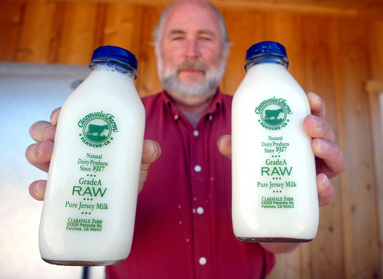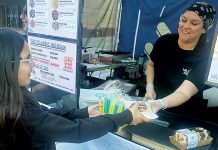
Claravale Farm owners fight to produce raw milk
Unlike conventional dairies, at Claravale Farm in San Benito
County milk is produced the same way it has been since the early
1900s
– from cow to bottle.
Claravale Farm owners fight to produce raw milk
Unlike conventional dairies, at Claravale Farm in San Benito County milk is produced the same way it has been since the early 1900s – from cow to bottle.
But state officials want to shut it down, and other “raw,” or unpasteurized, milk dairies statewide due to a law that was signed by Gov. Schwarzenegger in October 2007.
AB 1735 limits the amount of coliform bacteria allowed in raw milk to 10 per milliliter.
“It’s a limit that is going to make it impossible for most dairies to produce raw milk,” said Ron Garthwaite, a co-owner of Claravale Farm. “The state knows that.”
If the law is enforced, Claravale would not meet its requirements.
“Historically, we have not met it,” Garthwaite said.
Coliform bacteria do not belong in milk, said Steve Lyle, a spokesperson for the California Department of Food and Agrculture.
“The coliform standard is a measure of sanitation,” Lyle said. “The goal of the law is to make raw milk as safe as possible for the consumer.”
E. coli is one type of coliform bacteria, Lyle said.
“I’m not aware of specific identified coliform bacteria beyond E. coli,” Lyle said, “but coliform bacteria are a concern.”
CDFA staff test for E. coli in milk once per month, Lyle said.
Coliform bacteria are not dangerous, according to Garthwaite.
In March, the San Benito County Superior Court granted a restraining order that blocked CDFA staff from enforcing AB 1735, according to a Web site from Claravale Farm.
On May 23, after press time, Garthwaite and Cassidy will seek a preliminary injunction against the state. If they win the injunction, the state will not be able to enforce the law until the case is decided in court, Cassidy said.
“If we lose, then that’s that,” Garthwaite said.
Before they sought a restraining order, state officials were enforcing the law, Cassidy said.
“We were on the edge of being shut down,” Cassidy said.
Claravale Farm is located on 60 acres nestled deep in Paicines, and the owners relocated there from Watsonville in December 2007.
It started in the 1900s in Los Gatos. Garthwaite purchased the operation in 1997 from the 90-year-old owner. Garthwaite’s wife, Collette Cassidy, helps him run the dairy.
“There were about 2 acres left, surrounded by multi-million dollar houses,” Cassidy said.
Cassidy and Garthwaite moved the dairy to Watsonville, and eventually, after a prolonged struggle to get permits in Santa Cruz county, they moved to San Benito.
“What we couldn’t accomplish in 10 years and $500,000, we accomplished here [San Benito County] in under a month,” Garthwaite said. “And it cost us $20,000.”
When Garthwaite bought Claravale, the movement towards fresh and local food had already started, and they have never had a shortage of customers to buy their product.
“I thought I would have to at least advertise for it,” Garthwaite said. “Create a market for it, but the demand was already there. As soon as we put it in stores, the demand was more than we could fill, and always has been.”
They produce 250 gallons of milk per day from 55 cows. The milk is sold in select Whole Foods stores, New Leaf and independent grocery stores.
“The ones we are in, they often sell out the same day,” Garthwaite said. “Generally, if you want our milk, you can’t get it, because there’s such a demand for it.”
They thought their operation was going smoothly until they heard about the new legislation – a month after it had already been approved.
“We’re out here in the middle of nowhere trying to do our thing, pretty undisturbed” Cassidy said, “and surprise.”
Cassidy and Garthwaite have their milk is tested for pathogens once a month, such as listeria, salmonella and E. coli. Their cows are tested for tuberculosis and brucelosis a couple of times per year.
“If the cows are clean, then the milk has to be clean,” Garthwaite said. “If they say these pathogens are a concern, they would just test for it.”
Raw is the wrong word to describe their milk, Garthwaite said.
“It’s the word that regulators use,” Garthwaite said. “It’s fresh milk. If you want to buy a tomato, you wouldn’t say, ‘I’m going to buy a raw tomato.'”
Milk is pasteurized due to economics, according to Garthwaite.
“You make more money when it’s pasteurized,” Garthwaite said. “You can milk it dirty. You can keep it a long time. You can ship it around the world.”
His battle is about more than milk.
“It’s about food,” Garthwaite said.
People want fresh, local food, Garthwite said.
“The CDFA is absolutely opposite of that,” Garthwaite said. “They are on the wrong side of history.”
For now, they have been able to continue their operations due to the restraining order.
“Thanks to San Benito County,” Cassidy said.









